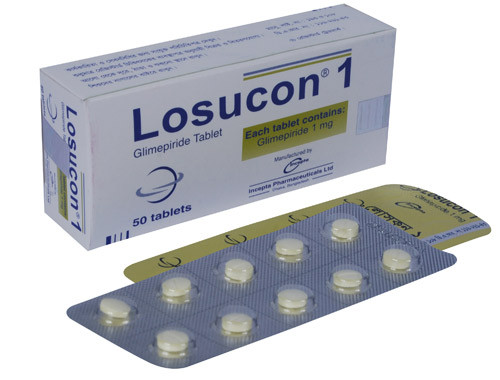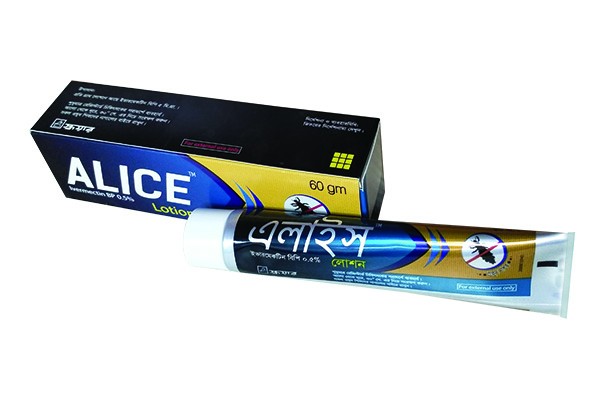

Losucon Tablet 1 mg (10Pcs)
Inhouse product
-
৳1,030.00
৳1,550.00 -
৳10.00
৳12.00 -
৳280.00
৳500.00 -
৳127.00
৳132.00 -
৳884.00
৳1,105.00 -
৳30.00
৳60.00
Reviews & Ratings
Generic
Glimepiride
Indications
Glimepiride is prescribed for the following conditions:
- Glimepiride is prescribed as an addition to diet and exercise in individuals with noninsulin dependent (Type II) diabetes mellitus (NIDDM) whose hyperglycemia cannot be managed by diet and exercise alone.
- Glimepiride and metformin can be taken together if diet, exercise, and Glimepiride or metformin alone do not result in sufficient glycemic control.
- Glimepiride is also approved for use in combination with insulin to reduce blood glucose levels in individuals whose hyperglycemia cannot be managed with diet and exercise in addition to an oral hypoglycemic medication.
- The use of Glimepiride and insulin together may raise the risk of hypoglycemia.
Pharmacology
Glimepiride is a sulfonylurea anti-diabetic medication that lowers blood glucose levels. Glimepiride's principal mode of action appears to be based on increasing the release of insulin from active pancreatic beta cells. Glimepiride works in tandem with glucose to increase beta cell sensitivity to physiological glucose stimulation, resulting in insulin production. Glimepiride's action may also be influenced by extrapancreatic effects such as reduced baseline hepatic glucose production, enhanced peripheral tissue sensitivity to insulin, and glucose absorption. A single dosage of Glimepiride has a 24-hour hypoglycemic effect in non-fasting diabetic individuals.
Dosage
In principle, the dosage of Glimepiride is governed by the desired blood sugar level. The dosage of Glimepiride must be the lowest which is sufficient to achieve the desired metabolic control. The initial and the maintenance doses are set based on the results of regular check of glucose in blood and urine. Monitoring of glucose levels in blood and urine also serves to detect either primary or secondary failure of therapy.
Initial dose and dose titration: the usual initial dose is 1 mg once daily, if necessary, the daily dose can be increased. Any increase can be based on regular blood sugar monitoring, and should be gradual, i.e., at intervals of 1 to 2 weeks, and carried out stepwise, as follows: 1 mg -> 2 mg -> 3 mg -> 4 mg -> 6 mg.
Dose in patients with well controlled diabetes: the usual dose range in patients with well controlled diabetes is 1 to 4 mg daily.
Distribution of doses: Timing and distribution of doses are decided by the physician, in consideration of the patient's current life-style. Normally, a single daily dose is sufficient. This should be taken immediately before a substantial breakfast or if none is taken immediately before the first main meal. It is very important not to skip meals after taking the drug.
Secondary dosage adjustment: As control of diabetes improves, sensitivity to insuiin increases; therefore, Glimepiride requirement may fall as treatment proceeds. To avoid hypoglycaemia, timely dose reduction or cessation of Glimepiride therapy must be considered. A dose adjustment must also be considered whenever the patient's weight or life-styie changes, or other factors arise which cause an increased susceptibility to hypo or hyperglycaemia.
Changeover from other oral antidiabetics to Glimepiride: There is no exact dosage relationship between Glimepiride and other oral blood sugar lowering agents. When substituting Glimepiride for other such agents, the initial daily dose is 1 mg; this applies even in changeover from maximum dose of other oral blood sugar lowering agents. Any dose increase should be in accordance with guideline given above in 'initial dose and dose titration'. Consideration must be given to the potency and duration of action of the previous blood sugar lowering agent. It may be necessary to interrupt treatment to avoid additive effects which would increase the risk of hypoglycaemia.
Administration
Glimepiride tablet must be swallowed with sufficient amount of liquid.
Interaction
The following interactions must be evaluated based on Glimepiride experience and known interactions with other sulfonylureas.
ACE inhibitors, aminosalicylic acid, anabolic steroids and male sex hormones, azapropazone, chloramphenicol, ciofibrate, coumarin derivatives, cyclophosphamide, disopyramide, fenfluramine, fenyramidol, fibrates, fluconazole, fluoxetine, guanethidine, ifosfamide, ifosfamide, MAO inhibitors, miconazole, oxpentifylline (parenteral high dosage), oxyphenbutazone, para-aminosalicylic acid, phenylbutazone, probenecid, quinolones, salicylates, sulphinpyrazone, sulfonamide antibiotics, tetracyclines, tritoqualine, trofosfamide.
Glimepiride's hypoglycemic effect may be mitigated by the following medications:
- Acetazoiamide, barbiturates, calcium channel blockers, corticosteroids, diazoxide, diuretics, glucagon, isoniazid, laxatives, nicotinic acid (large dosages), oestrogens, phenothiazines, phenytoin, progestagens, rifampicin, sympathomimetic drugs, and thyroid hormones
- H2 receptor antagonists, beta-blockers, clonidine, and reserpine may either increase or decrease the blood-glucose-lowering impact.
- Concurrent use of a beta-blocker, clonidine, guanethidine, or reserpine may conceal the warning signs of a hypoglycemic episode.
- Acute and chronic alcohol use can either increase or decrease Glimepiride activity in an unexpected way.
Contraindications
Glimepiride is not recommended for the treatment of insulin-dependent (type I) diabetes mellitus, diabetic ketoacidosis, or diabetic coma. Glimepiride should not be taken in individuals who are hypersensitive to it, other sulfonylureas, other sulfonamides, significant hepatic dysfunction, severe renal function impairment, or dialysis patients.
Side Effects
Hypoglycemia, transient vision impairment, nausea, vomiting, diarrhoea, stomach discomfort, urticaria, and a drop in blood pressure are all symptoms of hypoglycemia.
Pregnancy & Lactation
Glimepiride should not be used during pregnancy; instead, insulin should be used. Patients who are contemplating a pregnancy must notify their doctor and switch to insulin. Glimepiride ingestion combined with breast milk feeding may be harmful to the infant. As a result, nursing mothers should avoid using Glimepiride. A transition or full stop of breastfeeding is required.
Precautions & Warnings
The risk of hypoglycemia may be raised in the first few weeks of therapy, necessitating cautious monitoring. If such a danger exists, the dosage of Glimepiride may need to be adjusted. Hypoglycemia can be nearly immediately corrected by rapid carbohydrate consumption (glucose or sugar).
Therapeutic Class
Sulfonylureas
Storage Conditions
Store at temperatures no higher than 30°C. Keep away from light and out of children's reach.
Pharmaceutical Name
Incepta Pharmaceuticals Ltd
Frequently Bought Products
-
৳1,030.00
৳1,550.00 -
৳10.00
৳12.00 -
৳280.00
৳500.00 -
৳127.00
৳132.00 -
৳884.00
৳1,105.00 -
৳30.00
৳60.00
Online Shopping Bangladesh : MShopBD-Majumder Shop
MShopBD-Majumder Shop Online Shopping in Bangladesh is the Best Shopping store within 10000+ products cash on delivery in dhaka, Khulna, ctg & all over Bangladesh with COD-cash on delivery (Only Shipping Cost Advance ) under by www.esdp.gov.bd (bangladesh.gov.bd ) Home Delivery all Over Bangladesh different location and shop as like as Multivendor Online Sites in BD.
Thank you for choosing MShopBD - Majumder Shop!







